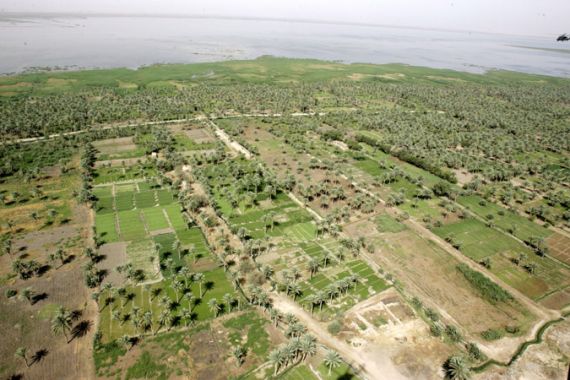TEDx Baghdad: Iraq is infinity
It is time to re-engage Iraq’s scattered, but highly educated diaspora, writes author.

 |
| Iraq enjoys a proud history of 5,000-year-old culture, dating back to ancient Mesopotamia [GALLO/GETTY] |
Washington, DC– “My father gave me a great Iraq that now I have to pass down to my son. Will I be able to deliver to him what my father gave to me?” Manhal Al-Habbobi looked straight into the eyes of his audience. It was the first-ever TEDxBaghdad conference, and Manhal was wrapping up his impassioned speech with a call to action for his fellow Iraqis in the audience and around the world watching. “Sometimes I wonder if we are the broken link in the chain,” he continued, “and will our generation be able to pass along this message of a great civilization to the ones to come.”
A gifted and visionary architect, Manhal had recently won a competitive bid to design the General Secretariat of the Council of Ministers, a $250 million project to develop one of Iraq’s principal government buildings. As a volunteer speaker coach, I had the honor of working with Manhal in crafting and delivering his speech to a global audience. In his speech, he emphasized the notion of infinity, a symbol found in 5,000-year-old cuneiform writing from Mesopotamia. Manhal drew the inspiration for the structure of his building from this symbol, paying tribute to both Iraq’s ancient heritage and its resilience over the millennia. His use of infinity was indeed a salient concept that truly embodied the spirit of the event and won the hearts of the audience. Little did I know that I would find myself flying to Iraq to directly witness this incredibly moving TEDx talk.
It was the first time I had ever been to my country of origin, a journey motivated in part by a desire to find an identity I only knew through the Iraqi diaspora. In Iraq, I visited family I had only known over the telephone, spoke Iraqi Arabic with locals on the streets of downtown Baghdad, and finally ate the mouth-watering delicacies I was told about while growing up. The Iraqi team members who flew in from abroad similarly carried an unwavering, against-all-odds longing to reconcile their own identity and discover the country only our parents had lived. Each of us was driven by dreams of a better Iraq, by an inexplicable connection to a place we barely knew, but somehow loved so deeply.
TEDxBaghdad focused on this faith: how we Iraqis can harness our potential to ensure an unforgettable event. Dismissing politics, religion and sectarian divisions, we chose instead to celebrate our identity, our heritage, our accomplishments, from architecture to medicine, from education to entrepreneurship. Seventeen speakers hailing from all over Iraq shared their ideas and stories of improbable triumph in the face of decades-old hardship and instability. Each one had seen death – death of family, death of friends – and yet not even one asked me, a lawyer, if I knew how they could immigrate abroad. Rather, they remained steadfastly committed to Iraq, driven to carve out their place in its long history. Their humility, determination and optimism were simply contagious.
Like many others who had only followed Iraq’s recent history on television or newspapers, my family and friends feared for my safety. But in the words of one of the TEDx speakers: “If you come with good intentions to do good, you will be welcomed as one of their own.” Her insight was indeed true as together, we made the impossible, possible. A galvanising force, bringing TEDx to Baghdad demonstrated beyond a doubt that infinite possibilities can be achieved when the Iraqi diaspora re-engages with the people of the country. By spurning preconceived notions of pessimism and fear, we were able to forge an unequivocal bond of solidarity and instill a sense of hope and promise in the lives of those we met on the ground.
With the withdrawal of US troops and recent escalation in violence, the world should not abandon hope of Iraq’s future. There has been a promising boom of global investment in the country, helping rebuild a war-torn infrastructure. But that’s just the beginning. We must re-engage Iraq’s scattered, but highly educated diaspora, especially the young generation. Numbering in millions across the world, we can collectively lend a hand, near or far, in providing Iraq’s youth with invaluable mentorship, funding, training, opportunities and inspiration. We can support this emerging talent by reassuring them that they are not forgotten. Rather, they form the very backbone of the country’s future – an area of focus that will likely be featured in future TEDx events in Iraq.
Manhal concluded his speech that day with a personal anecdote. He remembered visiting an Italian friend living in Milan in 2006, when Iraq was facing seemingly insurmountable civil strife. Seeing Manhal distraught at the state of his country, his friend’s six-year-old daughter came to him and said, “Do not worry, you will recover”. Perplexed, he asked her to elaborate. The child responded calmly: “Because Mesopotamia is 5,000 years old.” Simply put, Iraq is Infinity. It has survived the test of time for the past 5,000 years. And its destiny manifests that it will continue to do so for another 5,000 years—we are simply caretakers to ensure the Iraq we pass on is better then the one we were given. This endurance can be ascribed not only to Iraq but the entire Arab world, which is just now seeing a new dawn.
Hamada Zahawi is an Iraqi-American, Washington DC-based International Transactional Lawyer and Education Admissions Consultant. He was one of the Lead Speaker Coaches at TEDxBaghdad 2011.
The views expressed in this article are the author’s own and do not necessarily reflect Al Jazeera’s editorial policy.
